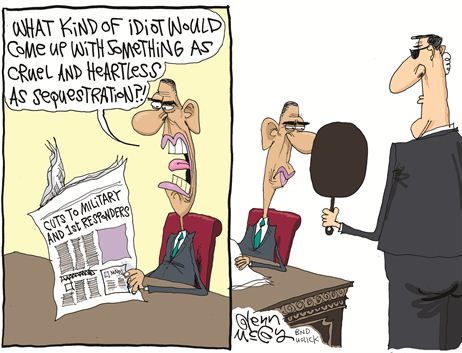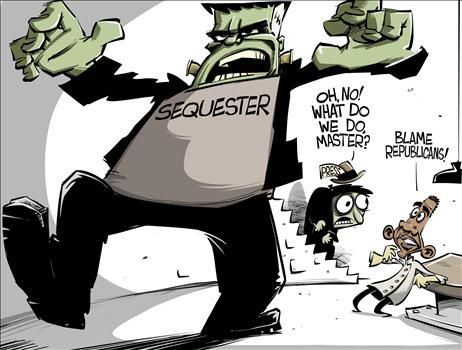“Already, some in Congress are trying to undo these
automatic spending cuts. My message to them is simple: No. I WILL VETO ANY EFFORT TO GET RID OF THOSE AUTOMATIC SPENDING CUTS TO DOMESTIC AND DEFENSE SPENDING. There will be no easy off ramps on this one.”
- President Barack Obama, 21 November 2011
“In the short term, the good news is that there’s going to be a forcing
mechanism to deal with what is the central ideological argument in
Washington right now, and that is: How much government do we have and
how do we pay for it? So when you combine the Bush tax cuts expiring, THE SEQUESTER IN PLACE,
the commitment of both myself and my opponent — at least Governor
Romney claims that he wants to reduce the deficit — but we’re going to
be in a position where I believe in the first six months we are going to
solve that big piece of business.”
The
Pinocchio Test
No
one disputes the fact that no one wanted sequestration, or that ultimately a
bipartisan vote in Congress led to passage of the Budget Control Act. But the
president categorically said that sequestration was “something that Congress
has proposed.”
Woodward’s
detailed account of meetings during the crisis, clearly based on interviews
with key participants and contemporaneous notes, make it clear that
sequestration was a proposal advanced and promoted by the White House.
In
sum: Gene Sperling brought up the idea of a sequester, while Jack Lew sold
Harry Reid on the idea and then decided to use the Gramm-Hollings-Rudman
language (which he knew from his days of working for Tip O’Neill) as a template
for sequester. The proposal was so unusual for Republicans that staffers had to
work through the night to understand it.
Oddly,
Lew in Tampa on Thursday, publicly asserted the opposite: “There was an
insistence on the part of Republicans in Congress for there to be some automatic
trigger…. [It] was very much rooted in the Republican congressional insistence
that there be an automatic measure at the end.”
This
prompted Woodward to go over his notes and interviews once again, to make sure
he had gotten it right.
“After
reviewing all the interviews and the extensive material I have on this issue,
it looks like President Obama told a whopper,” Woodward said. “Based on what
Jack Lew said in Florida today, I have asked the White House to correct the
record.”
We
had been wavering between Three and Four Pinocchios. But in light’s of Lew’s
decision to doubledown on Obama’s claim, we agree it’s a whopper.
Four
Pinocchios
'I was for SequesterSquatch before I was against it!'
- President Barack Obama

In FY2001, the government spent $1.8629 trillion. In FY2012, the Federal government spent $3.7956 trillion.
That’s a 103.74684631% increase in Federal spending since FY2001!
Pension Spending By The Feds:
2001: $475.1 billion
2002: $497.0 billion
2003: $510.5 billion
2004: $530.8 billion
2005: $557.7 billion
2006: $586.0 billion
2007: $628.3 billion
2008: $659.8 billion
2009: $730.4 billion
2010: $749.6 billion
2011: $775.6 billion
2012: $819.7 billion
That’s a 72.5320985% increase in pension expenses since 2001.
Healthcare Spending By the Feds:
2001: $389.6 billion
2002: $427.4 billion
2003: $469.0 billion
2004: $509.5 billion
2005: $549.2 billion
2006: $582.6 billion
2007: $641.8 billion
2008: $67.14 billion
2009: $764.4 billion
2010: $820.7 billion
2011: $858.2 billion
2012: $846.1 billion
That’s a 117.1714579% increase in healthcare expenditures since 2001.
Education Spending By The Feds:
2001: $63.6 billion
2002: $77.8 billion
2003: $90.5 billion
2004: $96.4 billion
2005: $106.4 billion
2006: $127.6 billion
2007: $100.8 billion
2008: $100.9 billion
2009: $89.8 billion
2010: $139.4 billion
2011: $113.7 billion
2012: $153.1 billion
The Feds have increased spending on education by 140.72327044% since 2001.
Defence Spending By The Feds (keep in mind that the Iraq War is over):
2001: $366.2 billion
2002: $421.7 billion
2003: $482.9 billion
2004: $542.4 billion
2005: $600.0 billion
2006: $621.1 billion
2007: $652.6 billion
2008: $729.6 billion
2009: $794.0 billion
2010: $847.2 billion
2011: $878.5 billion
2012: $902.0 billion
That’s a 146.31348989% increase in defence spending since 2001.
Welfare Spending By The Feds:
2001: $188.8 billion
2002: $229.4 billion
2003: $249.5 billion
2004: $244.4 billion
2005: $252.5 billion
2006: $254.2 billion
2007: $262.1 billion
2008: $322.3 billion
2009: $415.1 billion
2010: $502.3 billion
2011: $472.9 billion
2012: $451.9 billion
In the past 12 years, the Feds have spent $3.8454 trillion on welfare or $320.5 billion on average each year.
The Feds have increased overall welfare spending by 139.35381355% since 2001.
Fed’s Spending on “Protection”:
2001: $30.2 billion
2002: $35.1 billion
2003: $35.3 billion
2004: $45.6 billion
2005: $40.0 billion
2006: $41.0 billion
2007: $42.4 billion
2008: $48.1 billion
2009: $52.6 billion
2010: $54.4 billion
2011: $56.1 billion
2012: $62.0 billion
The Feds have increased overall “protection” spending by 105.29801324% since 2001.
Transportation Spending By The Feds:
2001: $54.4 billion
2002: $61.8 billion
2003: $67.1 billion
2004: $64.6 billion
2005: $67.9 billion
2006: $70.2 billion
2007: $72.9 billion
2008: $77.6 billion
2009: $84.3 billion
2010: $92.0 billion
2011: $93.0 billion
2012: $102.6 billion
That’s a 88.60294117% increase in transportation spending since 2001.
General Government Spending:
2001: $16.1 billion
2002: $17.8 billion
2003: $24.9 billion
2004: $23.4 billion
2005: $19.8 billion
2006: $19.5 billion
2007: $19.8 billion
2008: $20.8 billion
2009: $23.0 billion
2010: $24.7 billion
2011: $29.0 billion
2012: $33.6 billion
The Feds have increased overall general government spending by 108.69565217% since 2001.
"Other" Spending:
2001: $72.6 billion
2002: $72.1 billion
2003: $77.1 billion
2004: $75.5 billion
2005: $94.4 billion
2006: $126.2 billion
2007: $71.0 billion
2008: $99.3 billion
2009: $377.1 billion
2010: $29.7 billion
2011: $96.3 billion
2012: $199.6 billion
$1.3909 trillion was spent on "other spending" in 12 years or $115.91 billion per year.
"Other spending" expenditures have increased by 174.93112947% in the last dozen years.
Interest Spending:
2001: $206.2 billion
2002: $170.9 billion
2003: $153.1 billion
2004: $160.2 billion
2005: $184.0 billion
2006: $226.6 billion
2007: $237.1 billion
2008: $252.8
billion
2009: $186.9 billion
2010: $196.2 billion
2011: $230.0 billion
2012: $224.8 billion
We've spent $2.4288 TRILLION on debt service in the last 12 years or an average of $202.4 billion a year...and, that's been during a period of historically-low interest rates!
Deficit:
2001: $17.91 billion
2002: $157.8 billion
2003: $377.6 billion
2004: $412.7 billion
2005: $318.4 billion
2006: $248.2 billion
2007: $160.7 billion
2008: $458.6 billion
2009: $1,412.7 billion
2010: $1,293.5 billion
2011: $1,299.6 billion
2012: $1,327.0 billion
Our deficit has increased by 7309.26856504% in a dozen years!!!
Total Spending:
2001: $1.8629 trillion
2002: $2.0109 trillion
2003: $2.1599 trillion
2004: $2.2928 trillion
2005: $2.4720 trillion
2006: $2.6551 trillion
2007: $2.7287 trillion
2008: $2.9825 trillion
2009: $3.5177 trillion
2010: $3.4562 trillion
2011: $3.6031 trillion
2012: $3.7956 trillion
That’s a 103.74684631% increase in Federal spending in 12 years!
Gross Public Debt:
2001: $5.7699 trillion
2002: $6.1984 trillion
2003: $6.7600 trillion
2004: $7.3547 trillion
2005: $7.9053 trillion
2006: $8.4514 trillion
2007: $8.9508 trillion
2008: $9.9861 trillion
2009: $11.8759 trillion
2010: $13.5288 trillion
2011: $14.6742 trillion
2012: $16.3509 trillion
That's a 183.3827276% increase in the Federal Government's Gross Public Debt in 12 years!

"The U.S. fiscal gap, calculated (by us) using the Congressional Budget
Office’s realistic long-term budget forecast -- the Alternative Fiscal
Scenario -- is now $222 trillion. Last year, it was $211 trillion. The
$11 trillion difference -- this year’s true federal deficit -- is 10
times larger than the official deficit and roughly as large as the
entire stock of official debt in public hands.
This fantastic and
dangerous growth in the fiscal gap is not new. In 2003 and 2004, the
economists Alan Auerbach and William Gale extended the CBO’s short-term
forecast and measured fiscal gaps of $60 trillion and $86 trillion,
respectively. In 2007, the first year the CBO produced the Alternative
Fiscal Scenario, the gap, by our reckoning, stood at
$175 trillion. By 2009, when the CBO began reporting the AFS annually,
the gap was $184 trillion. In 2010, it was $202 trillion, followed by
$211 trillion in 2011 and $222 trillion in 2012.
When fully
retired, 78 million baby boomers will collect, on average, more than 85
percent of per-capita gross domestic product ($40,000 in today’s
dollars) in Social Security, Medicare and Medicaid benefits. Each
passing year brings these outlays one year closer, which raises their
present value.
Governments, like households, can’t indefinitely
spend beyond their means. They have to satisfy what economists call
their “intertemporal budget constraint.” The fiscal gap simply measures
the extent to which this constraint is violated and tells us what is needed to balance the government’s intertemporal budget.
The
answer for the U.S. isn’t pretty. Closing the gap using taxes requires
an immediate and permanent 64 percent increase in all federal taxes.
Alternatively, the U.S. needs to cut, immediately and permanently, all
federal purchases and transfer payments, including Social Security and
Medicare benefits, by 40 percent. Or it can mix these terrible fiscal
medicines with honey, namely radical fiscal reforms that make the
economy much fairer and far stronger. What the government can’t do is
pay its bills by spending more and taxing less. America’s children,
whose futures are being rapidly destroyed, are smart enough to tell us
this."
" To restrain the U.S.’s future budget crisis, the federal government must
raise taxes by at least 35% and cut entitlements such as health care
and Social Security by 35%, according to International Monetary Fund
economists."
"Eventually we do have a problem. The population is getting older, health care costs are rising ... . Something is going to have to give. We won't be able to pay for the kind of society we want without some increases in taxes and surely in the end it will require some middle-class taxes as well, maybe a value added tax. That's not all. We're also going to have to ... really make decisions about health care, (and) not pay for health care that has no demonstrated medical benefits. Death panels and sales taxes is how we do this."
- Paul Krugman, speech at Sixth & I Historic Synagogue in Washington, D.C, January 2013
"Somebody has to tell the middle class that either your taxes are going
to go up or your programs are going to get cut or else we're going to go
into financial oblivion, and nobody really wants to tell them that.”
- Howard Dean, February 2013
I've been trying to tell you, LoInFo dolts, that you cannot have this massive welfare state and expect only the wealthy to pay for it.
"It's not my fault! It's Bush's Republican's fault!"
http://tinyurl.com/ahcsfnz






















